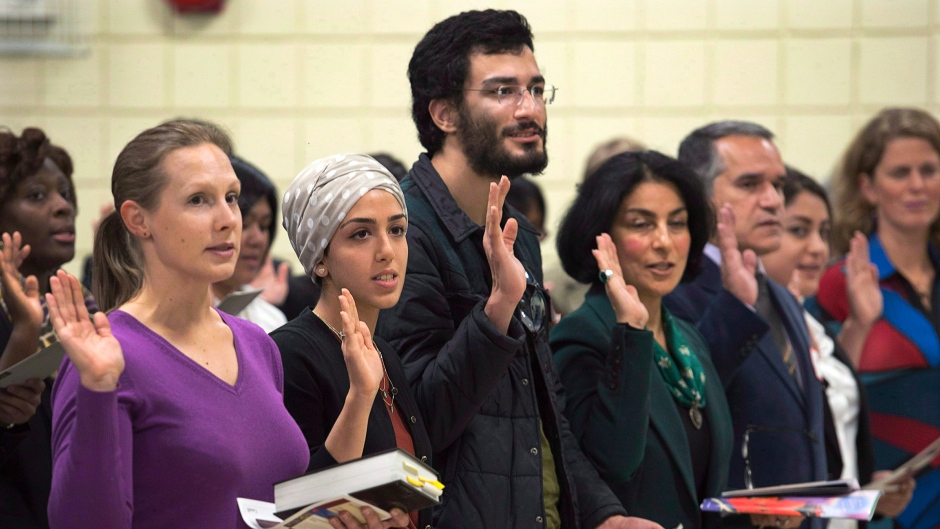
Proposed changes to the Canadian Citizenship Act was introduced on February 25, 2016. The changes in the legislation would provide greater flexibility for applicants trying to meet the requirements for citizenship, and help immigrants obtain citizenship faster. They would also repeal provisions of the Citizenship Act that allow citizenship to be revoked from dual citizens who engage in certain acts against the national interest. Additional changes are also proposed to further enhance program integrity.
Repealing the national interest grounds for citizenship revocation
Legislative changes that came into effect in May 2015 created a new ground for citizenship revocation that allowed citizenship to be taken away from dual citizens for certain acts against the national interest of Canada. These grounds include convictions of terrorism, high treason, treason or spying offences, depending on the sentence received, or for membership in an armed force or organized armed group engaged in armed conflict with Canada. The Bill repeals these new grounds. All Canadians who commit crimes should face the consequences of their actions through the Canadian justice system.
The ability to revoke citizenship where it was obtained by false representation, by fraud or by knowingly concealing material circumstances will remain in place. The Minister would continue to have authority to revoke citizenship in basic fraud cases, such as identity and residence fraud (which constitute the majority of cases), and the Federal Court would continue to have authority to revoke citizenship in cases where the fraud is in relation to concealing serious inadmissibilities concerning security, human or international rights violations, war crimes, and organized criminality.
Repealing the intent to reside provision
Since June 2015, adult applicants must declare on their citizenship applications that they intend to continue to reside in Canada if granted citizenship. The provision created concern among some new Canadians, who feared their citizenship could be revoked in the future if they moved outside of Canada. The Government is proposing to repeal this provision. All Canadians are free to move outside Canada. This is a right guaranteed in our Charter of Rights and Freedoms.
Reducing the length of time someone must be physically present in Canada to qualify for Citizenship
To help immigrants achieve citizenship more quickly, the Government is proposing to reduce the time required to be spent in Canada for citizenship for adults to three years (1095 days) within the five years before applying for citizenship. This will mean applicants can apply one year sooner than they can now. This offers greater flexibility for immigrants who may need to travel outside of Canada for various personal or work reasons.
Currently, the Citizenship Act requires applicants to be physically present in Canada for four years (1,460 days) within the six years immediately before applying for citizenship.
Allowing time in Canada before Permanent Residency to count toward the physical presence requirement
Under the Citizenship Act, people cannot count time they spent in Canada before becoming a permanent resident towards meeting the physical presence requirement for citizenship.
The changes in the new Bill would let non-permanent resident time count toward the new three year physical presence requirement for citizenship, for up to one year. Under this change, each day that a person is authorized to be in Canada as a temporary resident or protected person before becoming a permanent resident could be counted as a half-day toward meeting the physical presence requirement for citizenship.
These changes support the Government’s goal of making it easier for immigrants to build successful lives in Canada, reuniting their families and contributing to the economic success of all Canadians. The time credit will also encourage skilled individuals to come to Canada to study or work, and benefits groups like protected persons and parents and grandparents on visitors’ visas.
Eliminating the 183 days of physical presence requirement
The Bill proposes to remove the supplemental physical presence requirement, as keeping it would not allow applicants to benefit from the new non-permanent resident time credit. Applicants would no longer need to be physically present for 183 days in Canada during each of four calendar years that are within the six years immediately before applying for citizenship.
Amending the age range for language and knowledge requirements
Since the first Canadian Citizenship Act in 1947, citizenship applicants have had to have an adequate knowledge of English or French, as well as knowledge of the responsibilities and privileges of citizenship. Previous changes to the Citizenship Act expanded the age range of applicants who must meet the language and knowledge requirements from those aged 18-54 to those aged 14-64.
The Government is proposing to return to the previous 18-54 age requirement, removing a potential barrier to citizenship for applicants in both the younger and older age groups. For younger applicants, learning English or French and having an adequate knowledge of Canada is already achieved through schooling. For the older age group, language skills and knowledge of Canada are offered through a wide range of integration services.
Adult applicants aged 18-54 would still be required to provide evidence that they understand English or French and are able to hold a short conversation about common topics, understand simple instructions, and use basic grammar. They are also required to pass a knowledge test on Canada and the responsibilities and privileges of citizenship.
Program Integrity Enhancements
A number of changes to further enhance program integrity are also proposed.
Conditional Sentences: Currently, the Citizenship Act prohibits a person under a probation order, on parole or incarcerated in a penitentiary, jail, reformatory or prison from being granted citizenship or from counting that time towards meeting the physical presence requirements for citizenship. However, the provisions do not include conditional sentences (i.e. sentences served in the community with certain conditions) served in Canada. So currently, an applicant who is sentenced to a conditional sentence order could be granted citizenship or count that time towards meeting the physical presence requirements for citizenship. These amendments would change that. This change would apply to both new applications and those still being processed.
Maintaining requirements for citizenship until Oath taking: The Strengthening Canadian Citizenship Act introduced a rule that would not allow applicants to take the oath of citizenship if they no longer met the requirements for citizenship after the decision was made. Before this change, there was no authority to prevent an applicant in that situation from taking the oath. The time between the decision and taking of the oath is typically two to three months. However, the rule only applies to applications received after June 11, 2015, when the Strengthening Canadian Citizenship Act came into force, and not to applications received before that date. The proposed change would require all applicants to continue to meet the requirements of citizenship until they take the Oath, regardless of when their application was received.
Ability to Seize Documents: Unlike existing authorities under the Immigration and Refugees Protection Act, citizenship officers did not have the authority to seize fraudulent documents. This Bill would change that, giving citizenship officers authority under the Citizenship Act to seize fraudulent documents provided during the administration of the Act, including during in-person interviews and hearings. This improves the ability for Citizenship officers to carry out investigations and prevent further use of fraudulent or suspected fraudulent documents.
Source: Immigration, Refugees, and Citizenship Canada



